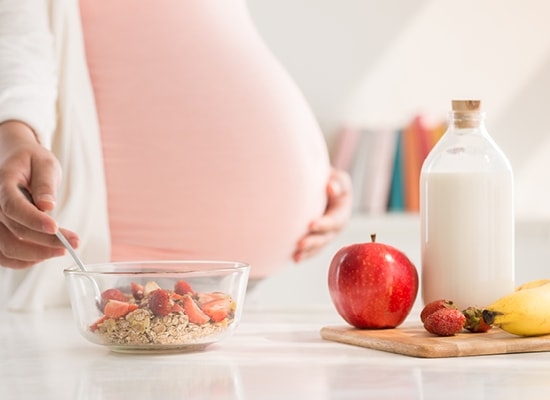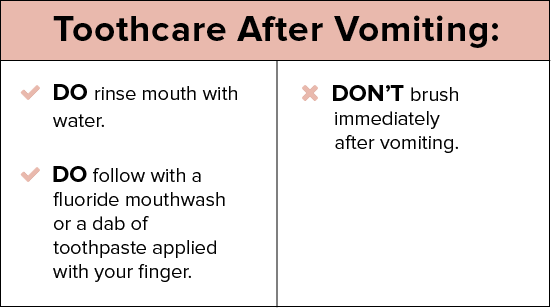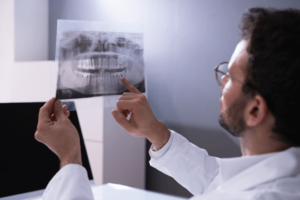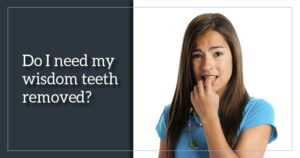How to Baby Your Teeth During Pregnancy

If you’re not up on the latest oral-systemic link, it may seem odd that pregnancy affects your teeth, but it does! At the same time, your dental health has a very real effect on your developing baby. Many articles report that poor dental habits have been associated with premature delivery, intrauterine growth restriction, gestational diabetes, and preeclampsia. (Yikes!)
The positive news, however, is that you CAN take control over your hygiene and general oral health, and can likely sidestep that old adage “one tooth is lost with every pregnancy.”
First of all, that outdated saying is simply not true! Calcium is not lost from a mother’s teeth during pregnancy, BUT there are still some real dangers to be aware of – and we want to share a few preventative tips to help you maintain good oral health throughout your pregnancy.
Read on to learn about a few potential perils, and find ways to keep your mouth healthy for BOTH you and your new bundle of joy.
Watch Out for Those Sweet Treats
Are you constantly searching out ice cream to go with those pickles? Some say that sweet cravings forecast a baby girl (sugar and spice, and everything nice!), but when it comes to sugary snacks, a more concrete fact is that an increase in carbohydrates can negatively affect your oral health. Simply put: more sugar means a higher chance of tooth decay.

To help ward off unwanted cavities, simply choose lower-sugar foods. In the event that only a sweet treat will satisfy your pregnancy craving, do your best to opt for a healthier option, like fresh fruit. BONUS: Strawberries are also said to have a teeth whitening effect (double score)!
It’s also wise to immediately rinse your mouth with milk or water after eating sugary foods. While brushing your teeth is undeniably better, if you’re feeling worn out and all you can muster is a swish of a beverage, it’s better than nothing – and hey, milk goes great with donuts … just saying.
Save Your Teeth from Morning Sickness
For many women, morning sickness is an unpleasant companion throughout pregnancy (specifically in the first trimester). If you’re feeling queasy and find yourself hunched over the toilet bowl, you have our most sincere sympathies.
The reason vomit affects your teeth has to do with the amount of acid your mouth is exposed to. Basically, stomach reflux and acids eat away at your tooth enamel (the outer covering on your teeth).

While it may seem like a good idea to remove the acid quickly, DO NOT brush your teeth immediately after vomiting. The vigorous, repetitive action of the toothbrush may actually scratch the tooth enamel while it’s still covered in stomach acids.
Instead, it’s best to rinse your mouth thoroughly with water, and follow up with a fluoride mouthwash or a dab of toothpaste applied with your finger. If you can, aim to brush about one hour after vomiting.
Prevent Hormonal Damage to Your Teeth
Another significant “bonus” about pregnancy: all those extra hormones! Hopefully you aren’t crying at car commercials, or experiencing any of the following pregnancy-related dental concerns, but if you are – just know that we are here to help you through them!
Pregnancy Gingivitis
Pregnancy gingivitis is basically an inflammation of the gums that causes swelling and tenderness. Have you noticed that your gums bleed a little (or a lot) when you brush or floss? While this is fairly normal, if left untreated, full-blown gingivitis can lead to more serious forms of gum disease, or worse.
We don’t want to freak you out, but gingivitis has been linked to low birth weight baby, or premature birth, so it’s definitely worth coming in for a routine teeth cleaning to check in on your gum health.
Periodontal Disease
Periodontal disease is a chronic gum infection that is caused by untreated gingivitis. Pregnancy may worsen this condition, and it can actually lead to tooth loss.
Again, if you suspect you’re dealing with gingivitis, please schedule an appointment so we can help before it leads to periodontal disease, which can be much more serious.
Pregnancy Tumors
Pregnancy tumors are lumps that appear along the gum line and between your teeth (most often in the second trimester). They may bleed easily but are not harmful or cancerous.
They may be related to excess plaque and usually disappear after pregnancy, but if you’re feeling concerned, please talk to your dentist about removing them.
Prepare for Birth With Preventative Action
Maintaining your own health – both before and during your pregnancy – is an important facet of caring and planning for your developing baby.
Pregnancy DOES affect your teeth, and many studies reveal that maintaining healthy teeth and gums not only impact your overall health, but that of your developing baby.

If you’re still in the planning stages of adding a new baby to your family, you would do well to visit your dentist and resolve any dental-related issues beforehand.
If you’re currently pregnant, please consider the points above, and schedule your appointment today! At the very least, a cleaning will set your mind at ease, and then you can focus on the fun parts of having a baby (like nursery planning and teeny onesies)!
How are you handling your changing body? Did any of these tips surprise you, or do you have any tips for other moms-to-be? Please share a comment below!
The content on this blog is not intended to be a substitute for professional medical advice, diagnosis, or treatment. Always seek the advice of qualified health providers with questions you may have regarding medical conditions. Re-posted with permission. Source: https://www.quickdentalanswers.com/pregnancy-teeth-tips/


